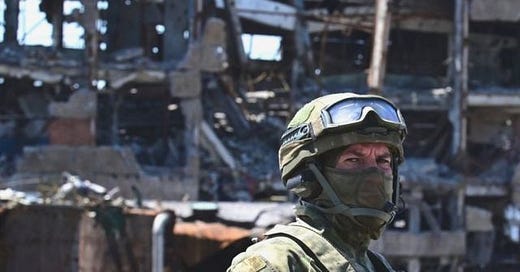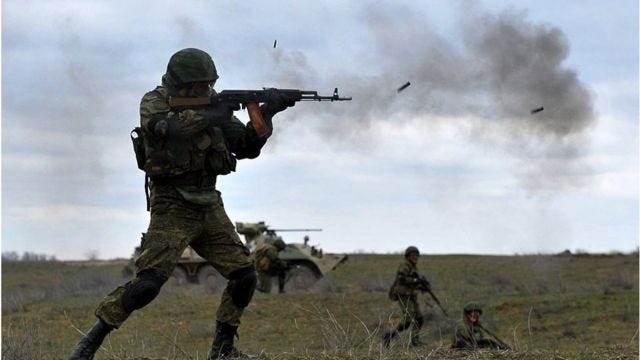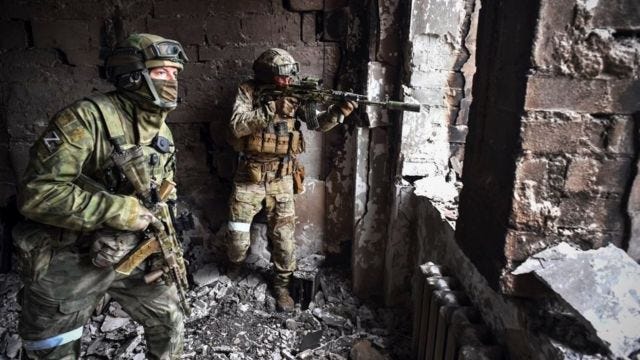“One-way ticket”. The Russian ‘volunteers’ fighting in Ukraine
Every week Russia sends hundreds of armed men on short-term contracts, to fight in Ukraine. Moscow calls them ‘volunteers’. As the BBC has learned, these volunteer brigades, often end up fighting on the hottest parts of the frontline. And yet, the training they get lasts only three to seven days before they are deployed.
Russian soldier on patrol in captured city (the photograph is not directly related to the figures in the story) © AFP
“In April I got a call from the military recruitment office asking me to go as a volunteer,” says Dmitri who lives in a small town in the Urals. [We have changed his name for security reasons)].
“They told me I’d be paid at least 130 thousand [roubles], and that they would cover the costs for food, uniform and travel, so I wouldn’t need to pay to get there. But the main thing was that they promised to help me pay off my debts.”
Dmitri says he, and some former colleagues who like him had fought in Chechnya in the early 2000s, were all phoned up by the military recruitment office “three or four times”. At first, he ignored the calls, but after losing his job and struggling with mounting debts, he decided it was time to find out more.
“One guy had a stroke right next to me”
There are currently three ways for Russian volunteers to get to the war in Ukraine:
• By signing a short-term contract with the Ministry of Defence. (A normal army contract is for between one and three years.)
• By going to Chechnya and signing a three-month contract there with the National Guard of the Russian Federation
• By entering into a contract with the military units of the self-proclaimed DPR and LPR (this is the least popular choice as soldiers in Donetsk and Luhansk are paid much less than in Russia. There is also less available in terms of compensation in case of injury or death).
Another way to the war is to get a job with the so-called Wagner Group, a private security company that usually recruits former professional soldiers.
Dmitri felt that going via the Ministry of Defence seemed to be the simplest and most secure option of the three. This route is a popular choice as military recruitment offices tend to be located nearby, which saves time and money travelling to other cities or even regions.
“I agreed to go and I didn’t even need to have a medical examination,” Dmitri continues.
“They were obviously trying to get people dispatched as quickly as possible, so they scrapped all check-ups and physicals. We were all rounded up within a couple of days and off we went. We arrived at night. In the morning we were kitted out: army boots, uniform, as part of the gear we were given these holdalls still in the old Soviet-style, a towel, a bit of soap and underwear that was also Soviet. Mine had 1960 printed on it.”
It was at that moment, Dmitry says, that he started wondering if he was making a mistake.
“There were plenty of weapons, oiled and in good condition. Cartridges, too. But that’s the end of the positives. The artillery range was just a mess, the officers didn’t really care about us. We had no tactics training, the personnel were very badly organised. I was quite shocked at that. Some of the volunteers had clearly never held a sub-machine gun before, never laid eyes on a tank, and yet they were headed for the front in a few days’ time. Surely you have to train people? “
“It almost goes without saying that new boots rub and you have to break them in or you get blisters the very next day. I knew that from experience so I’d actually brought my own, but they made us all wear what we were given.”
In early March, Russia’s Ministry of Defence began to advertise thousands of vacancies on popular job-hunting websites such as HeadHunter. Adverts for short-term contracts in the Russian army appeared by entrances to buildings and on public transport in many Russian cities.
In many regions, where social mobility is very low, contracted military service is one of the only ways to earn a living. Thus, if the military recruitment office in, for example, Nizhnekamsk, promises volunteers a monthly allowance of about 200 thousand roubles, that’s five times the average wage in that city. Many of the people who take up the Ministry of Defence’s offer have no real experience of military action.
Dmitri remembers how most of the volunteers at the meeting point where he found himself in Rostov were aged 45 and above, and how some of them didn’t look all that healthy.
“Of course, I completely understand these pensioners. Their patriotism compelled them to go, but many of them were on the heavier side, and half of them wore glasses with strong prescriptions of minus 5 and worse. One guy even had a stroke right next to me when we lined up. Basically, I took all this in and realised that for them this was probably a one-way ticket.”
After just three days at the base, Dmitri decided to go home.
“At this point we still hadn’t signed any contracts. And so, when we were told to fall in for shooting training, I just said no. About five others left the unit with me. It was just *** (madness), the whole thing was a shambles,” he says.
According to Dmitri, the men who stayed at the camp were sent to Ukraine the very next day and took part in the battles for Izyum.
“I’m in contact with one guy. He slaved away for a month, was wounded, and went home. He told me it was tough and he barely made it out alive. Some volunteer guys who’d come via Grozny [capital of Chechnya] had rescued him. They seemed to have had some okay medical training, and good first-aid kits. They bandaged him up and got him out of there. Otherwise he would’ve bled to death.”
© AFP
Calling at Chechnya
The Chechen authorities are actively sharing videoclips on social media along with reports about training volunteers at the Russian Special Forces University base. They promise complete provision of equipment and food and even reimbursement of travel costs to Grozny.
“I knew I couldn’t go via the military recruitment office - I’m 48 and I didn’t do my military service because of a hand injury,” says Alexey [name changed for security reasons].
“I saw an opening via Chechnya and I jumped at the chance. I arrived in Grozny, went to the mayor’s office and told them I wanted to go and fight as a volunteer. I was sent to Gudermes.”
The Russian Special Forces University base is in Gudermes. It’s a private educational institution, founded by Ramzan Kadyrov to train members of the special forces. The university’s team of instructors is led by Daniil Martinov, a former officer in the FSB ‘Alpha’ special force.
“The training at the Special Forces University really is great. The instructors are excellent. You wake up, have breakfast and have exercises all day. How to crawl, how to shoot from different positions, how to quickly change the magazine, what to do if the cartridge gets jammed. They also teach you how to use a grenade launcher. The tactics lessons were invaluable. All of it was really helpful later when we were working in the village,” Alexey recalls.
Alongside tactics and arms training, there are also ideology sessions for the volunteers.
“They showed us these secret documents. They were plans for attacking Donbass and Russia. If Putin hadn’t launched this operation, our cities would have been in flames by now”, Alexey is convinced.
He’s probably referring to the 60-page document of the National Guard of Ukraine that the Russian Ministry of Defence published in March. The document, of which the authenticity cannot be verified, talks about organising group military exercises for a few subdivisions of the National Guard of Ukraine at a base in the Lvov area, not far from the Polish border. The document makes no mention of any offensive against Donbass or Russia, and yet the Russian defence department and Russian state media frequently cited it during the first phase of Russia’s invasion of Ukraine.
Alexey’s training (and that of roughly 200 colleagues) before he was sent to Ukraine lasted 10 days. He arrived in Gudermes in early May and by the 15th he found himself on the frontline in the Luhansk area in Ukraine. At the end of May, the training period in Gudermes for volunteers was shortened. Now it only lasts a week.
“I think that’s fine. When the instructors are that good, that’s plenty of time. They pass on their proper battle expertise, none of it watered down. I used all that knowledge later and it really helped me,” Alexey says.
Military experts disagree with Alexey. Specialists note that 7-10 days’ worth of training would be sufficient only to refresh the skills of those who already have combat experience. Compare this with the fact that conscripts heading for Afghanistan from the USSR were given 4-6 months’ worth of training.
“It was hell there, absolute hell”
While in Gudermes, Alexey and other volunteers like him signed a three-month contract with the National Guard of the Russian Federation. Then their battalion was transferred to Luhansk.
“When we arrived, it was hell there, absolute hell. A few of the guys in my battalion had fought in Syria. Even they *** [were taken aback]. They said that Syria was nothing compared to what’s going on in Ukraine. The shooting was brutal and the fights were tough”.
Alexey was first wounded during the capture of Rubezhnoye.
“The Ukrainians, of course, had thought of everything when it came to technology. There we are under fire, we are lying on the ground, and I raise my head to take a look - there’s a copter hovering above us, clearly helping to direct their fire. When the shootout was over, we ran to change our position, the copter flew after us and we were soon under fire again. That’s when I felt my first graze”, Alexey recalls.
Many settlements captured by Russia have been heavily shelled © Getty Images
Hardest of all for him was clearing the small villages on the way to Severodonetsk.
“We got into the village more or less without a fight. We even cheered up. The Ukrainians had retreated into the woods. But things kicked off again. We were almost incinerated by mortars and “grad” missiles. It was terrifying. There were still a few people left in the village - mostly grannies and grandads. I went into one house and told them, “you need to leave, the area’s under fire”, but they replied asking why should they leave when they’d lived their whole lives in this village. Later a mortar hit the house and they were all killed, says Alexey.
According to Alexey, his platoon from Gudermes was almost constantly on the frontline.
It is brigades of volunteers such as these, who’ve signed short-term contracts with the Ministry of Defence and with the National Guard of the Russian Federation, together with the soldiers from the so-called Wagner Group, that make up most of Russia’s attacking forces on the frontline. This is confirmed by two of the BBC’s sources, located at the forefront of the fighting on the Russian side of the line.
According to sources, many army subdivisions have already suffered heavy losses in the first few months of fighting in Ukraine, and so efforts are being taken to conserve them.
Our sources’ observations are backed up by data that the BBC has gathered by analysing confirmed losses of Russian troops.
More likely to be killed?
As of the 20th June, based on open sources, the BBC has confirmed the names of no fewer than 155 Russian volunteers killed in Ukraine. Until May, there had been no mention whatsoever in Russian media of any volunteers dying.
The data, gathered by the BBC together with ‘Mediazona’ (a publication branded a foreign media agent by Russia) and a team of volunteers, does not reflect the actual number of losses, as we are relying only on the publicly confirmed announcements of deaths. Still, by piecing together information, we can understand and analyse what is happening to the Russian army in this war.
The number of volunteers killed is skyrocketing - every week another 30-40 deaths are added to the list. No other army division has announced deaths so frequently.
Moreover, 57 per cent of the volunteers killed have been people over the age of 40 (25 per cent of the people who went to fight were over the age of 50). This differs dramatically from the rate of losses among other Russian army divisions - elsewhere 47 per cent of confirmed deaths have been soldiers aged 18 to 26.
Alexey declined to talk about the losses in his subdivision, citing wartime laws. He himself left his unit at the beginning of June after a tank shell blew up next to him.
He is currently being treated in one of Saint Petersburg’s hospitals and is eager to return to his unit. It must be said, the doctors aren’t too sure of his chances of doing so. Alexey might not recover from the three lots of acoustic shock to his right ear. Whether he will regain movement in his right hand is also uncertain - a shell splinter severed one of the critical nerves.
“I have these terrible headaches which are the worst part. I can hardly sleep, but then I’m always in a pretty good mood. The doctors say I’ve undergone severe psychological stress and they’ve prescribed some kind of pills, but I’m not going to take them,’ says Aleksey.
“I’m not sure right now what I’ll do next, what job I might do. I can’t stop thinking about our battles and what it was like. I’m still there in my head”.
You can read this story in Russian here.
Translated by Elsa Haughton.






